- Home
- Sharon M. Draper
Out of My Mind Page 2
Out of My Mind Read online
Page 2
“No!” Mom said more forcefully. “You are not going to have a tantrum on me!”
I didn’t want the blocks. I wanted to tell her they were dangerous. I wanted her to tell somebody to get rid of them before a child got sick. But all I could do was scream and point and kick. So I did. I got louder.
Mom rushed out of the toy section, pushing the cart real fast. “Stop it!” she cried out at me.
I couldn’t. It made me so angry that I couldn’t tell her. The tornado took over. My arms became fighting sticks, my legs became weapons. I kicked at her with my feet. I screamed. I kept pointing in the direction of those blocks.
People stared. Some pointed. Others looked away.
Mom got to the door of the store, yanked me out of the cart, and left it with all her selections sitting there. She was almost in tears when she got to the car. As she buckled me in my seat, she almost screamed at me, “What is wrong with you?”
Well, she knew the answer to that one, but she knew that was not my usual behavior. I gulped, sniffed, and finally calmed down. I hoped the people at the store watched the news.
When we got home, she called the doctor and told him about my crazy behavior. He sent a prescription for a sedative, but Mom didn’t give it to me. The crisis was over by then.
I don’t think Mom ever figured out what I was trying to say that day.
CHAPTER 4
Doctors. Where do I start? Doctors really don’t get me. Mom’s a nurse, so I guess she speaks their language, but they sure don’t know how to talk to me.
I’ve seen dozens of doctors in my life, who all try to analyze me and figure me out. None of them can fix me, so I usually ignore them and act like the retarded person they think I am. I paste on a blank look, focus on one wall, and pretend their questions are too hard for me to understand. It’s sort of what they expect anyway.
When I turned five, it was time to think about enrolling me in school. So my mother took me to a doctor whose job it was to figure out how smart I was. She wheeled me in, locked the brake so my wheelchair would not roll, and made sure the lap strap was fastened. When my seat belt comes undone—and it does every once in a while—I slide out of that wheelchair like a piece of wet spaghetti.
The specialist was a very large man. The bottom button of his shirt had come undone, and his stomach poked through above his belt. Gross!
“My name is Dr. Hugely,” he said in a booming voice.
For real. I couldn’t make this stuff up.
“We’re going to play a game today, okay? I’ll ask you some questions, and you get to play with the toys here. Won’t that be fun?”
I knew it would be a long, long hour.
He brought out a stack of well-used, hopefully not lead-tainted, wood blocks, then leaned in so close to me, I could see the pores in his face. Gross! “Can you stack these in order according to size?” he said loudly and slowly, as if I were hard of hearing and really stupid.
But who was being stupid? Didn’t he know I couldn’t grab the blocks? Of course I knew which block was bigger than the other. But I couldn’t stack them if he paid me money! So I just took my arm and swept them all to the floor. They fell with a wooden clatter. I tried not to laugh as he picked them up. He breathed really hard as he reached for them.
Next, he held up glossy eight-by-ten cards with different colors painted on each one. “Tell me when you see the color blue, Melody,” he said in that voice that told me he thought this was all a waste of time.
When the blue card showed up, I pointed to it and made a noise. “Buh!” I said.
“Marvelous! Tremendous! Stupendous!” he shouted. He praised me like I had just passed the test to get into college. If I could have rolled my eyes, I would have.
Then he showed me green, so I kicked and made a noise, but my mouth can’t make the G sound. The doctor looked disappointed.
He scribbled something on his clipboard, pulled out another stack of cards, then said, loudly, “I’m going to ask you some questions now, Melody. These might be hard, but do your best, okay?”
I just looked at him and waited while he placed the first set of cards in front of me.
“Number one. Which one of these is not like the others?”
Did he get this stuff from Sesame Street?
He showed me pictures of a tomato, a cherry, a round red balloon, and a banana. I know he was probably looking for the balloon as the answer, but that just seemed too easy. So I pointed to the banana because the first three were round and red, and the banana was not.
Dr. Hugely sighed and scribbled more notes. “Number two,” he said. He showed me four more cards. This time there were pictures of a cow, a whale, a camel, and an elephant. “Which animal gives birth to a calf?”
Now, I watch Animal Planet all the time. I know for a fact that all the animals he had pictured there had babies called a “calf.” I thought doctors were supposed to be smart. What to do? I hit each picture slowly and carefully, then did it once more just to make sure he understood. I don’t think he did.
I heard him mumble “cow” as he wrote more notes. It was clear he was giving up on me.
I noticed a copy of Goodnight, Moon on his bookshelf. I think it was written in Spanish. It was called Buenas Noches, Luna. That would have been fun to look at, but I had no way of telling him I’d like to see the book.
After watching Sesame Street and Dora the Explorer a million times, and sitting for hours watching the Spanish channels, I could understand quite a bit of Spanish if it was spoken slowly enough—and at least enough words to read the title of that book. He never thought to ask me about that, of course.
I knew the words and melodies of hundreds of songs—a symphony exploding inside my head with no one to hear it but me. But he never asked me about music.
I knew all the colors and shapes and animals that children my age were supposed to know, plus lots more. In my head I could count to one thousand—forward and backward. I could identify hundreds of words on sight. But all that was stuck inside.
Dr. Hugely, even though he had been to college for like, a million years, would never be smart enough to see inside of me. So I put on my handicapped face and took my mind back to last summer when Mom and I went to the zoo. I really liked the elephants, but talk about stink! Actually, Dr. Hugely sort of reminded me of one of them. My mom and the doctor had no idea why I was smiling as we rolled into the waiting room while he wrote up his evaluation of me. It didn’t take long.
I’m always amazed at how adults assume I can’t hear. They talk about me as if I’m invisible, figuring I’m too retarded to understand their conversation. I learn quite a bit this way. But this conversation was really awful. He didn’t even try to soften the news for my mom, who, I’m sure, felt like she got hit by a truck.
He began by clearing his throat. “Mrs. Brooks,” he then said, “it is my opinion that Melody is severely brain-damaged and profoundly retarded.”
Whoa! Even though I was only five, I had watched enough Easter Seals telethons to know this was bad. Really bad. I felt a thud in my gut.
My mom gasped, then said nothing for a full minute. Finally, she took a deep breath and protested quietly, “But I know she’s bright. I can see it in her eyes.”
“You love her. It’s only normal to have wishful thinking,” Dr. Hugely told her gently.
“No, she has a spark. More than that—a flame of real intelligence. I just know it,” my mother insisted, sounding a little stronger.
“It takes time to accept the limitations of a beloved child. She has cerebral palsy, Mrs. Brooks.”
“I know the name of her condition, Doctor,” my mother said with ice in her voice. “But a person is so much more than the name of a diagnosis on a chart!”
Good try, Mom, I was thinking. But already her voice was losing its edge, melting into the mushiness of helplessness.
“She laughs at jokes,” my mother told him, the ice in her voice replaced by desperation, “right at the punch line.�
�� Mom’s voice faded. What she was saying sounded ridiculous, even to me, but I could see she just couldn’t find the words to explain her gut feeling that I had some smarts stuck in here.
Dr. Hugely looked from her to me. He shook his head, then said, “You’re lucky she has the ability to smile and laugh. But Melody will never be able to walk on her own or speak a single sentence. She will never be able to feed herself, take care of her own personal needs, or understand anything more than simple instructions. Once you accept that reality, you can deal with the future.” That was just plain mean.
My mom hardly ever cries. But she did that day. She cried and cried and cried. Dr. Hugely had to give her a whole box of tissues. Both of them ignored me while she sobbed and he tried to find nice words to say to make her feel better. He didn’t do a very good job.
Finally, he gave her options. “You and your husband have several decisions to make,” he told Mom. “You can choose to keep her at home, or you can send her to a special school for the developmentally disabled. There aren’t many choices here locally.”
Where do they get those almost-pleasant-sounding phrases to describe kids like me?
Mom made a sound that could have been the mewing of a kitten. She was losing it.
Dr. Hugely continued. “You can also decide to put Melody in a residential facility where she can be cared for and kept comfortable.”
He pulled out a colorful brochure with a smiling child in a wheelchair on the cover and handed it to Mom. I trembled as she took it.
“Let’s see,” the doctor said, “Melody is, ah, five now. That’s a perfect age for her to learn to adjust to a new environment. You and your husband can get on with your lives without her as a burden. In time, her memories of you will fade.”
I stared at Mom frantically. I didn’t want to be sent away. Was I a burden? I never thought about it like that. Maybe it would be easier for them if I weren’t around. I gulped. My hands got cold.
Mom wasn’t looking at me. She was staring daggers at Dr. Hugely. She crumpled up the tissue she held and stood up. “Let me tell you something, Doctor. There is no way in heaven or hell that we will be sending Melody away to a nursing home!”
I blinked. Was this my mother? I blinked again, and she was still there, right up in Dr. Hugely’s face!
She wasn’t finished. “You know what?” my mother said as she angrily hurled the brochure into the trash can. “I think you’re cold and insensitive. I hope you never have a child with difficulties—you’d probably put it out with your trash!”
Dr. Hugely looked shocked.
“And what’s more,” she continued, “I think you’re wrong—I know you are! Melody has more brains hidden in her head than you’ll ever have, despite those fancy degrees from fancy schools you’ve got posted all over your walls!”
It was the doctor’s turn to blink.
“You’ve got it easy—you have all your physical functions working properly. You never have to struggle just to be understood. You think you’re smart because you have a medical degree?”
He was wise enough to keep his mouth shut and ashamed enough to lower his head.
Mom was on a roll. “You’re not so intelligent, sir— you’re just lucky! All of us who have all our faculties intact are just plain blessed. Melody is able to figure out things, communicate, and manage in a world where nothing works right for her. She’s the one with the true intelligence!”
She marched out of his office then, rolling me swiftly through the thick doors. In the hall we did a quick fist bump—well, the best I could manage. My hands were no longer cold.
“I’m taking you right now and enrolling you at Spaulding Street Elementary School,” she announced with determination as we headed back to the car. “Let’s get busy!”
CHAPTER 5
I have been at Spaulding Street Elementary School for five years. It’s very ordinary—filled with kids, just like the schools I see on television shows.
Kids who chase each other on the playground and run down the hall to get to their desks just before the bell rings.
Kids who slide on icy patches in the winter and stomp in puddles in the spring.
Kids who shout and push.
Kids who sharpen their pencils, go to the board to do math problems, and open their books to read a poem.
Kids who write their answers on notebook paper and stuff their homework into backpacks.
Kids who throw food at each other in the lunchroom while they sip on juice boxes.
Kids who sing in the choir, learn to play the violin, and take gymnastics or ballet or swimming lessons after school.
Kids who shoot baskets in the gym. Their conversation fills the halls as they make plans, make jokes, make friends.
Kids who, for the most part, ignore kids like me.
The “special needs” bus, as they call it, has a cool wheelchair lift built in the door, and it picks me up every morning in front of my house. When we get to school, the drivers take their time and make sure all the belts and buckles are tight before they lower all of us with walkers or wheelchairs or crutches or helmets down on the bus lift, one by one, to the ground. Then an aide will roll us, or help us walk, over to a waiting area.
When the weather is bright and sunny, we sit outside the school. I like to watch the “regular” kids as they play four-square while they wait for the bell to ring. They look like they’re having so much fun. They ask one another to play, but no one’s ever asked any of us. Not that we could, anyway, but it would be nice if somebody would say “Hi.” I guess the four-square players must think we’re all so backward that we don’t care that we get treated like we’re invisible.
I was so excited when Mom first enrolled me here. I thought I’d learn new things every day, but mostly it was simply something to do that took up time and got me out of the house. In second and third grades I probably learned more from the Sci Fi or Discovery Channels than I ever learned at school. My teachers were nice, most of the time, but they would’ve needed X-ray vision like Superman to see what was in my head.
I am in a special program with other children with what they call “disabilities.” Our ages range from nine to eleven. Our “learning community”—what a joke— has been together since I started school. We never seem to move up and on like other classes. We just do what we did the year before, but with a new teacher. We don’t even get a new classroom each year.
So the same kids I’m with now were together in second grade with a teacher named Mrs. Tracy. As third graders we suffered through Mrs. Billups, who could have got the award for worst teacher in the world. There are six self-contained learning communities in our wing of the building—children with various conditions, from preschoolers to kids who ought to be in high school by now.
Our classroom, room H-5, might be nice for babies, but give me a break! It’s painted yellow and pink. One wall is covered with a sun with a happy face, a huge rainbow, and dozens of flowers—also with smiley faces. The other wall is painted with happy bunnies, kittens, and puppies. Bluebirds fly all over a sky with perfect white clouds. Even the birds are smiling. I’m almost eleven years old, and if I have to look at puppies in paradise one more day, I think I’ll puke!
Ashley, the youngest in our group, actually does puke quite a bit. She’s nine, but she could pass for three. She has the smallest wheelchair I’ve ever seen.
She’s our fashion model. She is just plain beautiful— movie-star eyes; long, curly hair; and a tiny pixie nose. She looks like a doll that you see in a box on a shelf, except she’s prettier. Her mother dresses her in a perfectly matching outfit every day. If she has on a pink shirt, she wears pink slacks, pink socks, and two tiny pink bows in her hair. Even her little fingernails have been done to match.
When we do what the teachers and therapists call “group” activities, it’s hard for Ashley to participate. Her body is really stiff, and it’s tough for her to reach or grab or hold anything.
Every Christmas they make the ki
ds in H-5 decorate a stupid six-foot Styrofoam snowman. I don’t know what the children in the regular classrooms get to do, but I know it’s close to holiday time when whatever teacher we have that year pulls this thing out of a closet.
Mrs. Hyatt, the kindergarten teacher, loved that messed-up snowman, just three huge balls of yellowing Styrofoam, stuck together with pins and pipes.
“Let’s decorate, children!” she said in her squeaky and annoying voice. “We are going to place decorations with Velcro or toothpicks or glue—whatever works—on Sydney, our H-5 holiday snowman!”
I don’t know how old the snowman was at that point, but poor Sydney could not stand up straight. It leaned like a drunk who needed the wall to hold it up. Mrs. Hyatt gave us green snowflakes. Green? We were the dumb kids. I guess we weren’t supposed to care. Brown garland. Stars in purple and pink.
“Do you like the snowman, Ashley?” Mrs. Hyatt asked her. It’s almost impossible for Ashley to communicate because her body is so tight. Her “talking board” has just two words on it—yes and no. She turned her head slightly to the left for no. I bet she wished she could knock the thing down.
Compared to Ashley, Carl is huge. Even though he’s just nine, he’s got a special wheelchair that’s extra wide, and it takes two aides to lift him in and out of it. But he’s good with his hands. He can move his own chair, and he can hold a pencil well enough to write his name. And stab a snowman.
Carl sticks pencils and rulers into the snowman’s torso and pens into its head. Mrs. Hyatt used to clap her hands and say in her little squeaky voice, “Good job, Carl! So very creative!”
Carl would just laugh. He can talk, but only in very short sentences that usually have two parts. He has very strong opinions. “Snowman is dumb,” he’d yell. “Very, very dumb.”
I think he hates the snowman as much as I do. One year he pinned a diaper on the back and another on the front of the bottom third of the snowman. The teacher let them stay. Carl knows diapers.
When he poops in his pants, which is almost every day, the whole room smells like the monkey house at the zoo. The aides are so patient with him, though. They snap on their rubber gloves, clean him up, change his clothes—he always wears sweats—and sit him back in his chair. Those aides deserve medals. We’re not an easy bunch.

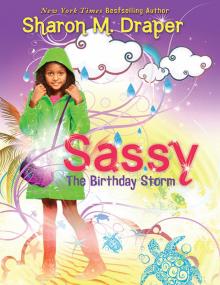 The Birthday Storm
The Birthday Storm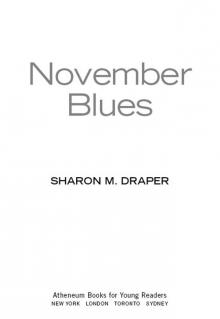 November Blues
November Blues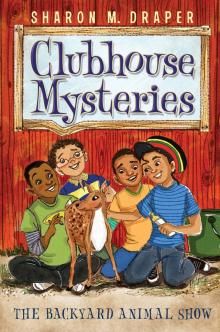 The Backyard Animal Show
The Backyard Animal Show Copper Sun
Copper Sun Romiette and Julio
Romiette and Julio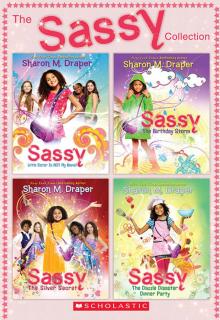 The Sassy Collection
The Sassy Collection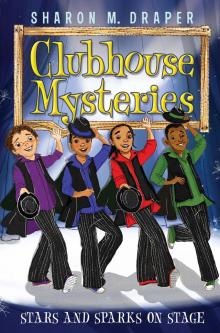 Stars and Sparks on Stage
Stars and Sparks on Stage The Battle of Jericho
The Battle of Jericho Tears of a Tiger
Tears of a Tiger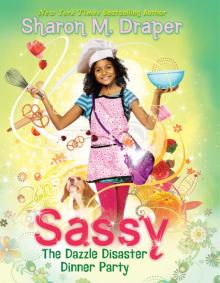 The Dazzle Disaster Dinner Party
The Dazzle Disaster Dinner Party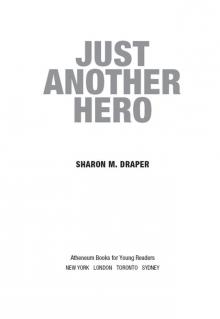 Just Another Hero
Just Another Hero Forged by Fire
Forged by Fire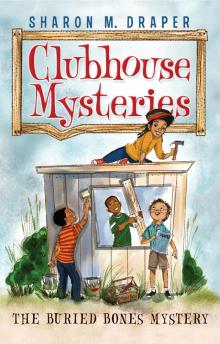 The Buried Bones Mystery
The Buried Bones Mystery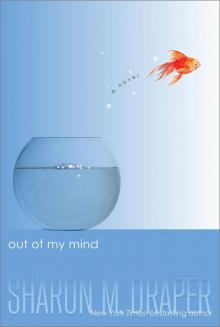 Out of My Mind
Out of My Mind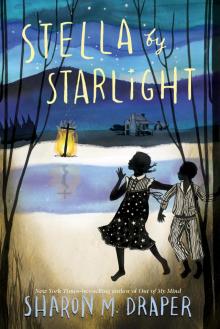 Stella by Starlight
Stella by Starlight Panic
Panic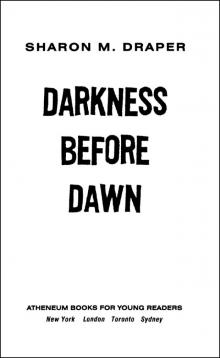 Darkness Before Dawn
Darkness Before Dawn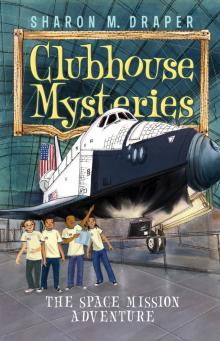 The Space Mission Adventure
The Space Mission Adventure Double Dutch
Double Dutch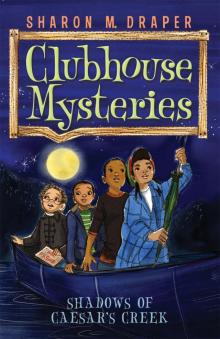 Shadows of Caesar's Creek
Shadows of Caesar's Creek